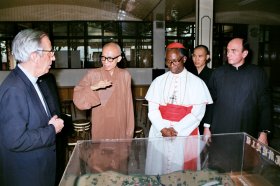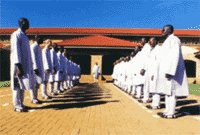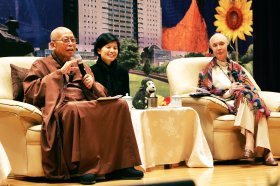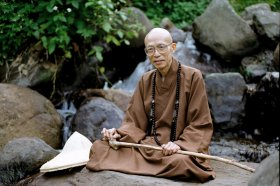Buddhism in Taiwan (Part II)
Current Taiwanese Buddhism
One unique feature of Buddhism in Taiwan is that the nuns are very active. For the recent 2 decades, Master Zeng-yen, a nun disciple of Master Yin-shun, is one of the most (if not the most) well-respected Buddhist master in Taiwan.

She even established a TV station to promote her idea and share the news of her organization. During the past decade, whenever and wherever a disaster occurred in any corner of the world, there would be members from her organization—the Buddhist Compassion Relief Tzu Chi Foundation. They would always be there, busying around to help out.
For example, in 1999, there was a big earthquake in Central Taiwan, where some one thousand people were killed and plenty buildings got destroyed. We call it the "921 earthquake".
During the first week after the disaster, Tzu-chi set more than 20 thousand volunteers to work for the victims, and in 2 years built more than 50 primary schools and middle schools for the children in the disaster area. Tzu-chi's members are always quick, direct and gentle to the people they aid.
Tzu-Chi's Master Zeng-yen has established 6 big modernized hospitals around Taiwan. Because master Zeng-yen is so concerned about charity work, she has touched numerous people's hearts and has gained some 6 million supporters all over the world. In the year of 2000, the Canadian education department even put master Zeng-yen and the Tzu-chi people's compassionate actions on the text books of the junior middle school students.
As a matter of fact, in the history of Buddhism, master Zeng-yen is the most popular nun while living and the Buddhist nun who has had the most followers in the world. People in Taiwan call it "the miracle of Taiwan" and certainly feel proud of her. You might wonder why a Taiwanese Buddhist nun can achieve so much? We may have some discussion on this subject later on.
Now I would like to talk about master Hsing-yun, who is one of the best organizers not only in the Buddhist circle but also in the world today. Master Hsing-yun became a novice monk at the age of 12 in mainland China.
He came to Taiwan with the exile government of China when he was 23 years old. He is a very good story-teller and has been working very hard in spreading the general Buddhism to the public in Taiwan and abroad for the recent 60 years.
He set up the biggest monasteries in Taiwan and countries like America, South Africa, Australia, Brazil, Canada, Holland etc. Each of them can accommodate as many as 1000 people for certain activities.

Beside the head quarter in Kaohsiung, Taiwan—Fokuangshan (Buddha Light Mountain), he has established more than 200 branch temples in major cities around the world within 35 years.
He also has a lay followers' organization that helps him promote Buddhism: the Buddha's Light International Association (BLIA) which was established in 1991. It consists of some 180 chapters and 2000 sub-chapters. BLIA is the biggest Chinese association in the world.
Under Master Hsing-yun's leadership Fokuanshan has also established 3 universities, 16 colleges, and many kindergartens, primary schools, high schools, nursing homes, and children's homes in and out of Taiwan.
Master Hsing-yun has the vision of promoting harmony, respect and tolerance among different religions. He has been actively participating in religious dialogues in all the continents of the world.
He is also concerned about restoring the Bikhsuni precepts beyond the boarder of Taiwan. In 1998, He held a Full Ordination Ceremony in Bodhgaya-- the place where Sakyamuni Buddha got enlightenment.
A lot of the Buddhist nuns in Southern and South-eastern Asian countries got the access to become fully ordained nuns at the time. Nowadays, there are some 2,000 monks and nuns in his monasteries, the biggest monastic order in Taiwan.
Now I'd like to give you a more detailed introduction to my master and the organization I come from—the Dharma Drum Mountain, in Chinese Fagushan. It is not only because I am closely related to this Buddhist organization but also because it is very important and I know it better.
As some of you might already know that Master Sheng-yen passed away on February the 3rd this year 2009. And the whole country's mass media covered so much about his thought, contributions and his organization—the Dharma Drum Mountain.
If you go to Yahoo and key in Master Sheng-yen , it will show you that about 4 million items related to this master. That is incredible. In the year of 1998, Master Sheng-yen was viewed as one of the 50 most influential people in Taiwan over the past 400 years by the very popular Chinese magazine: Common wealth.

In fact, Dharma Drum Mountain,—the Buddhist group that Master Sheng-yen had founded, is not very big. And he did not have that many monks and nuns. Nor did he establish many branches all over the world. His main effort through his lifetime was to share what he has learned from Buddhism.
Master Sheng-yen left home to join the monastic order at the age of 13. He had a teacher who taught him the meaning of Buddhist literature in the temple. Soon after he knew that Buddha's teaching is for the living humanity not for the deceased, he started to think about a question, that is Buddha Dharma is so good, but why so few people know about it and so many people misunderstand it. So he made up his mind to learn Buddhism as much as he could and tried to explain it in a direct and simple way that even primary school students can understand.
Despite his compassionate vows, Master Sheng-yen had a difficult life in his early age. He was forced to join the army at the age of 20 when the communist took over mainland China. He came to Taiwan with the troop and served the country as a soldier for 10 years.
During that time he wrote essays for Buddhist magazines in Taiwan, using the pen name of General of Awakening the World although he was only a low rank soldier. Who would use such a pen name?
He rejoined the Buddhist monastic order when he was 30 years old. Then he spent 6 years in solitary retreat at a temple in southern Taiwan. He did a lot of prostrations, meditated a lot and wrote 7 books based on his own research in that confined small room of the temple.
Not long after he came out of his solitary retreat, he went to Japan for the institutionalized study with a vision to promote the social status of Buddhist monastics in China, and to obtain the qualification of establishing academic institutes on Buddhism in Taiwan. He received a MA and a PhD degree from Rissho University in Japan. Afterward, he went to America to be a meditation teacher.

He had lectured and taught meditation in many colleges in America, European countries and other countries for more than 30 years. His works on instructing Chan practice has been translated into 15 different languages. In fact, he was the most well-respected Chinese Chan master in the world.
Thus he had the opportunity to have a public dialogue with his Holiness the Dalai Lama in New York, 1998. He was the first Chinese Buddhist master who had the honor of having public dialogue with Dalai Lama in history.
In the year 2000, a summit of the world religious and spiritual leaders was held at the hall in the United Nations where Master Sheng-yen delivered a keynote speech right after Kofi Annan the UN Secretary General even though he came from Taiwan because he was so well respected in the world.
After that, master Sheng-yen traveled a lot around the world and dedicated himself to continuous dialogues and promoting joint efforts among religious leaders from diverse faiths to enhance world peace.He also spent efforts on promoting opportunities for outstanding women and youth leaders in the world to share their ideas and actions for the last decade.
Master Sheng-yen authored more than 100 books on academic works, general Buddhism, Buddhist precepts, history and so on. Among them, the book with the title of "Correct Understanding of Buddhism" has been published more than 3 million copies in Chinese language. It has made numerous people converted into Buddhism.
The Buddhist Institute: Chung-Hwa institute of Buddhist Studies now the Dharma Drum Buddhist college, that he founded has been one of the best among its type in the world. Its Buddhist journal—The Chung-hwa Buddhist journal is with the highest quality and is the most bountiful and informative one among the Buddhist journals in Taiwan.
He established a Sangha university for the monks and nuns. He also had the vision to establish a really good university in Taiwan with the name of Dharma Drum University. It will be having students from the year 2010.
Master Sheng-yen had set the policy that the organization of Dharma Drum Mountain spend some 20% of its efforts on charity works, and the remain on academic educations and educations through public outreaching such as summer camps, retreats, speeches, ceremonies and conferences etc.

He held meditation retreats for the elite from diverse occupations. During times of crisis the country had faced his words of encouragement always had the power to calm people down and bring more peace to the society. He also visited in person to the disaster districts and spent much time consorting people in need.
Although Master Sheng-yen is gone, his idea of uplifting the character of humanity and building a pure land on earth will lead the members of the Dharma Drum Mountain to continuously work for the benefit of human beings and non human beings as well. And it will also be carried on by whoever agree with him in every corner of the earth planet.
In addition to the above-mentioned masters—Zeng-yen, Hsing-yun and Sheng-yen, there are many more powerful Buddhist masters in Taiwan. Some of them are experts of preaching while the others might be good at meditation. Some of them concern about school drop-outs while the others dedicate themselves on social movements and so on.
As for the usage of mass media, there are four Buddhist TV stations in Taiwan, including Tsu-chi, Fokuangshan, Life and Buddhism. Their programs are generally speaking more positive for the society and our people than the average TV stations. Publications are also really flourishing in Taiwanese Buddhist circle. Fokuangshan has a daily news: Renjien Fubau ( Merit Times) There are plenty of Buddhist books, magazines and journals in Taiwan. They all play a good role for the popularity of Buddha's teachings on this island.
After Taiwanese government stopped the martial law in the island, there have been more and more foreign masters come to Taiwan from Tibet, Thailand, Burma and even western countries to teach Buddhism. Some of them just stayed for a few days. A lot of them set up permanent organizations and have ever lasting plans to teach or work here.
At the same time, besides Tsu-chi, Foguanshan and Dharma Drum Mounatin (DDM) plenty of the local Buddhist organizations are trying hard to share the faith outside of Taiwan. And they are more open minded with the diverse ways of thinking and doing things then ever.
The progress of globalization has been quite rapidly in Taiwan as each part of the world does. Taiwanese Buddhists are facing the challenge of meeting the needs of modern people, while having more and more opportunities to exchange ideas and to learn from citizens from other corner of the world.
We are looking forward eagerly to seeing the shared vision of building a pure land on earth—or making a heaven in our world—will be come true through the joined efforts by each of us, now and in the future.
End.
Buddhism in Taiwan (Part I)
(By Guo Hsiang)
